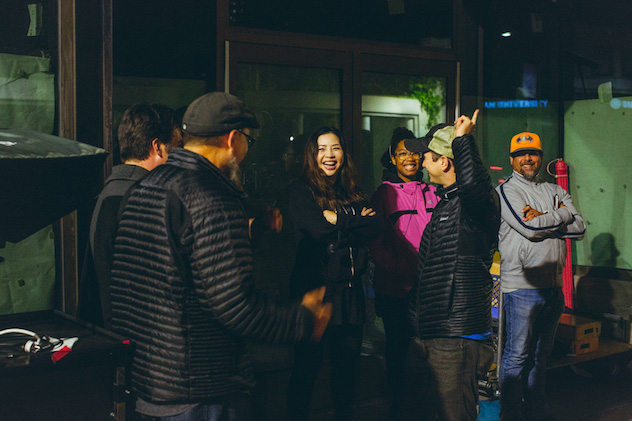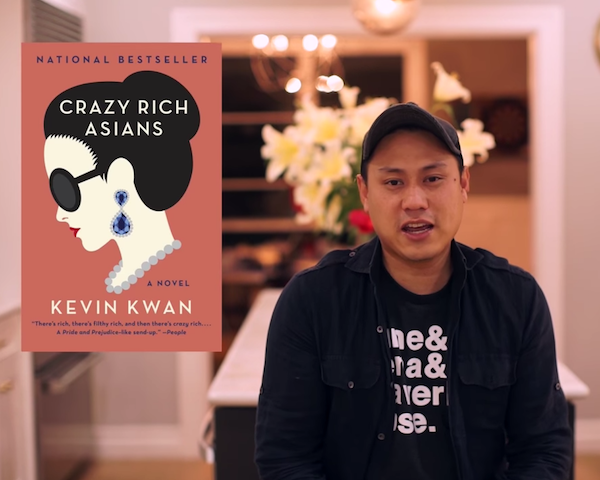As told to Serena Kim
After receiving her graduate degree from USC, Nina Yang Bongiovi headed to Shanghai to work as a director’s assistant in martial arts action films. It was the ideal education for the future Hollywood film producer. Now, Bongiovi is thriving as Forest Whitaker’s producing partner under their banner Significant Productions.
“Fruitvale Station” dramatizes the last day of Oscar Grant, the 22-year-old Oakland resident murdered by the police at a BART station, and garnered over 55 awards worldwide. “Sorry to Bother You” stars Lakeith Stanfield and Tessa Thompson opposite Steven Yeun in an absurdist dark comedy touching upon race, culture and capitalism. And in “Roxanne Roxanne,” Bongiovi developed the untold story of one of the greatest female battle rappers of all time, Roxanne Shante. “People often ask me what it’s like being an Asian American producing black films. My reply would be, ‘You mean culturally significant, excellent films, right?’” said Bongiovi. Right.
I relate to certain oppressions in our society because my family immigrated to this country from Taiwan. I’m not second-generation Chinese American. I’m actually a first-generation immigrant who came to this country with my mom and my siblings. We faced a lot of prejudice and racism growing up, and it has always affected me. I was angry. I had identity issues. I wasn’t sure where I belonged. I wished I wasn’t Chinese at the time. I wanted to assimilate because I didn’t want to be picked on. But as I became more mature, I worked on finding myself and discovering my identity. In college, I was finally coming into my own, but even then, I was trying to balance two cultures.
I then traveled a lot between China and the U.S., working in the Hong Kong action film industry, and I saw a lot of Caucasian couples adopting Chinese babies. However, I never saw people of color doing so. No Asians. No African Americans. No black or brown people. So, I decided to tell a story about an interracial couple — black and Chinese — who go to China to adopt a baby. They face racism, prejudice and agony through cultural differences and preconceptions. That’s how I came into contact with Forest Whitaker.
I developed a screenplay and offered it to him to star, through his agent. He actually read the script and loved the story, but wanted to elevate the writing. So we went down this path of doing more research about the culture in Shanghai — from a black perspective. Forest hung out with my dad, brothers and childhood friends pretty much every day while we were in China, but when we applied for a film permit with the Chinese government, we were denied. I guess the topics of racism and prejudice, on top of Chinese adoptions, were a big red flag, literally.
I was pretty depressed because I wanted to shed light on oppression and systemic racism in different parts of the world through film. Forest thereafter got a deal at ABC Studios (in 2010) and asked me to join him. Serendipitously, we founded Significant Productions on the Disney lot.
I didn’t know what Forest saw in me. When I met him in 2009, I was despondent. I was going through a lot with my family. Within an 18-month period prior, I lost both my mom and my sister to illnesses. They were my rock in Los Angeles. I was still trying to tell stories through producing, but struggling to stay afloat. Maybe Forest saw the light in me that I couldn’t see or find at the time. He threw me a lifeline.
Within the first year of our operations, something incredible happened. We met a young man named Ryan Coogler while he was still studying at USC School of Cinematic Arts, getting his MFA. His short films moved us to tears, and we were determined to champion his first feature. From the day Forest and I saw the first cut of “Fruitvale Station,” to the moment we premiered at Sundance Film Festival, we knew the mission of our company: Support excellent filmmakers of color, fight hard to get their stories funded, produce them with great intention and integrity and launch their careers into the universe.
I hope that more Asian Americans consider film producing as a career in entertainment because, at the end of the day, it’s all about having a voice in our industry, and strong producers have a voice. When you become a true producer, you’ll find allies who will help you realize your projects. It takes a village. You work alongside filmmakers to shape the story so that it’s compelling enough to take to investors.
Producing is about identifying talent, procuring concepts/stories/IP, then taking all those elements into the development phase. Script development is a science; film financing is a required skill set; physical production will make you appreciate all that it takes to make a great project on a logistical level; post-production has its own language, and it needs to be understood and respected; and delivering a picture (legal and technical deliverables) to a studio/distributor is a cruel and unusual punishment — but someone has to do it.
Furthermore, you need to be proficient in reading/dissecting contracts, budgets and schedules, and know what is possible or impossible. Nonetheless, a producer also has to build and maintain relationships with talent and literary agents. Learning every step of real producing takes time. But when you can master these steps, you can become a formidable force in the industry and have a seat at the table.









